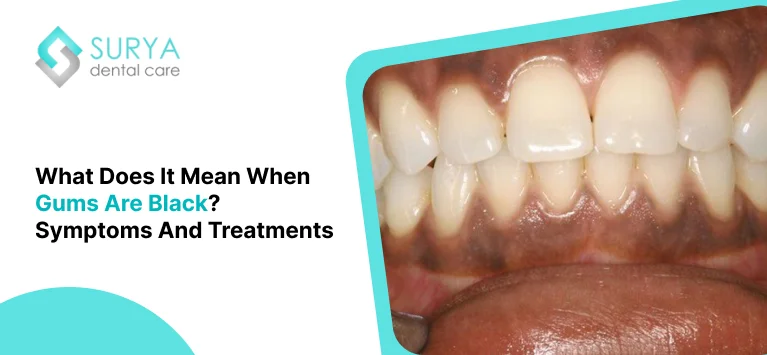Gum color varies for each person. In general, our gums appear pink in color. Few people have gums with tiny reddish dots or dark pink. In contrast, purple, black colored gums also appear for some people. You may also notice such persons. Right?
If you have such black gums, don’t neglect it because it may be a warning sign of any serious dental disease underlying the gums.
Similarly, don’t scare or worry regarding the black colored gums. Black gums are not caused only by dental diseases. Many unknown factors are related to black gums. Our Dentists in Surya Dental Care have listed them in this post. Let us see.
1) Melanin
Melanin is the natural substance present in our body. It provides the color of our skin. If a person has a high concentration of melanin in his/her body, it is common that their gums also appear dark like their skin. If the black gums occur as a result of the genetic effect, it will not cause pain or any issues.
2) Bruises
Gum injuries occur with hard brushing or flossing and while biting hard substances that damage the gum tissues and others. When there is a wound in the gums, it appears red and at times black or brown. Such black gums caused due to injuries will go off after healing.
3) Amalgam Tattoo
Dental bridges, crowns and filling materials are made by blending certain metals. The mixture is known as amalgam. While treating cavities, the diseased tooth is filled with dental filling materials that include amalgam.
If the amalgam particles dislodged in or around the filled tooth, it will cause dark spots on the gum regions around the tooth. It makes the gum appear dark or black in color. Such amalgam tattoos will cause any complications or lead to serious infections.
4) Smoking
You may notice the lips of smokers appear purple in color. It is due to the nicotine present in cigarettes. The same is also a reason behind black gums.
Melanocytes is the melanin-producing cells present inside our body. When a person consumes nicotine while smoking, it induces more melanocytes which in turn produces higher levels of melanin. It causes dark spots, patches on the gum. If a person smokes frequently, the dark patches will extend all over the gum tissues and turn it as black gum.
Quit smoking is the only solution to overcome black gum disease and restore healthy gums
5) Medication
Medications or drugs which we take to get rid of infections like chlamydia are effective to stain our gums. Likewise, medications like minocycline and others that contain antimalarial agents are also powerful to cause gum discoloration.
If you encounter such black or dark colored gums due to medication, consult your Doctor to replace it.
6) Eruption Hematoma
While the teeth are erupting, a cyst is formed in the underlying region. Sometimes, few drops of blood mixed with the cyst. This condition is known as Eruption Hematoma. The eruption cyst with blood appears dark. It makes the gum looks black in color.
It is normal and you don’t need to worry about this. It will go off over a period of time.
7) Acute Necrotizing Ulcerative Gingivitis
It is a kind of gum disease that occurs due to poor oral hygiene that leads to breed up of bacteria in the mouth. The infection produces a black colored biofilm on the gums by deposition of the dead cells over the gum layer. This ends in dark gums.
Its symptoms include bad breath, gum bleeding and other symptoms that indicate gingivitis. Professional dental cleaning done at the dental office is required to cure this.
8) Health issues
As mentioned earlier, black gums occur as a side effect of various diseases or health infections. Most common complications that are associated with dark gums are as follows:
- Oral Melanoacanthoma – The cause of this condition is still unknown. Researchers believe that the friction in the mouth caused due to jaw movements is the reason. It makes different parts of the mouth including gums appear dark.
- Addison’s disease – It is a serious condition that affects our adrenal glands. This in turn, affects the normal functioning of our body. Hyperpigmentation arises as an effect of this disease and produces dark patches in various parts including gums. It can be identified with symptoms like pale colored spots on the skin, dehydration, etc.
- Thrombocytopenia – This is a condition that arduous the blood clotting process. It takes advantage of an injury in the gum tissues and inherits the gum wounds.
- Blue Nevus – Similar to Oral Melanoacanthoma, the base cause of this disease is also not identified. It produces a small mole in the gums that looks like swelling and makes the gums look discolored. A Dentist can easily diagnose this condition by seeing the size and color of the mole.
- Melanotic Macule – This causes dark colored patches in various parts of our body including gums. It may cause due to genetic disorders for some people. Some people are affected by this disease when they become older.
Conclusion
Black gums are not complicated to treat or harmful as you think. Even though it is harmless, it leaves one with unattractive appearance or smile. Modern technologies in Dentistry have empowered to shade or lighten the dark colored gums with gum whitening treatments.
FAQs
Melanin may be the cause of the typical color variance between brown and pink gums. Usually benign, this hue difference does not point to any underlying medical conditions.
The buildup of plaque and tartar can result in irritation and discolouration of the gums, causing brown gums. Preventing this problem can be aided by consistent brushing and flossing.
Black gums are typically benign and not hazardous. It is advised to see a dentist or physician for a complete evaluation if they are accompanied by additional symptoms including bleeding, pain, or swelling.
Melanotic macules, another name for black gums, are an excess of melanin that can be brought on by a genetic predisposition, hormonal fluctuations, or specific medical diseases like Addison's disease.









Leave a Comment